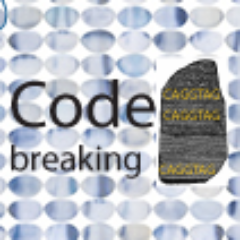
StarkLab
@stark_lab
Followers
2K
Following
72
Media
8
Statuses
90
Vienna, Austria
Joined January 2013
Congratulations to @FilipNemcko PhD (@stark_lab, IMP), who recently defended his thesis: 'Systematic identification and functional characterization of transcriptional regulators' - Well done Filip! 🥂🍾 @univienna @IMPvienna @IMBA_Vienna @gmivienna @MaxPerutzLabs
1
4
26
Nature biotechnology highlighting ours @stark_lab and @steinaerts @ibrahimihsan recent work on designing cell type-specific enhancers 🎉
0
4
39
Research Highlight: Designer enhancers for cell-type-specific gene regulation
1
8
31
Cracking the 2nd code of life has been a major goal of @AlexanderStark8 and the @stark_lab since their start at the @IMPvienna @ViennaBioCenter in 2008. Big thanks to all members and collaborators, especially @deAlmeida_BP & @Eileen_Furlong who made this possible! (fin)
1
2
18
See also the related and complementary work by @ibrahimihsan @steinaerts (@VIBlifesciences) in fly brains https://t.co/pvynbGsfw2 – together, these publications are the first to read & write enhancer DNA in vivo. (9/N)
1
2
15
Our work demonstrates the feasibility of targeted enhancers design! Transfer learning using genome-wide and small-scale functional datasets should enable the design of tissue-, cell type-, and cell state-specific enhancers in any system. For more: https://t.co/TIlPrBKYaK (8/N)
nature.com
Nature - Deep learning and transfer learning were used to design tissue-specific enhancers in the Drosophila embryo that were active and specific, validating this approach to achieve tissue-, cell...
1
2
18
We then design 8 synthetic enhancers for 5 tissues de novo (CNS, epidermis, gut, muscle and brain, 40 total) and test them in fly embryos in vivo. Of the 40, 31 (78%) are active and 27 (68%) function in the target tissue (100% for CNS and muscle) – we “wrote” enhancer DNA! (7/N)
1
1
12
@deAlmeida_BP first trains DNA accessibility models on genome-wide scATAC data and then adjusts these models by transfer learning to predict tissue-specific enhancer activity. The final models achieve high PPVs in CV, for example >70% for CNS and epidermis (6/N)
1
2
9
Today, we - @stark_lab and @Eileen_Furlong lab (@EMBLheidelberg) - report the design of 40 synthetic enhancers for 5 tissue types in fruit fly embryos, in vivo. With only a few hundred enhancers per tissue for training, we adopt a stepping-stone transfer-learning approach: (5/N)
2
29
131
Only with the availability of #DeepLearning #AI and #STARRseq, @deAlmeida_BP in 2022 managed to predict and design synthetic enhancers de novo for a single cell type https://t.co/e8A2DbKA3t (and #MPRA-derived synthetic enhancers can work in vivo, Gosai et al bioRxiv 2023) (4/N)
1
1
15
Scientists however cannot read & write enhancer DNA, nor evaluate mutations/SNPs in enhancers. A decade ago, we tested >7700 enhancer candidates in fly embryos ( https://t.co/mCy2VWEaJj
@BarryJDickson @evgenykvon) revealing rich sequence-to-activity maps – but still no code (3/N)
1
1
9
Our genomes contain about 20,000 protein-coding genes and probably millions of gene-regulatory regions called enhancers. In the 4-letter alphabet of the DNA, these regions encode tissue-specific gene expression patterns (see the 4 mouse enhancers from the VISTA Browser) (2/N)
1
0
11
We are very excited to present a major breakthrough achievement – the de novo design of synthetic enhancers for selected tissues in fruit fly embryos in vivo using deep- and transfer learning, @deAlmeida_BPet al published today in @Nature
https://t.co/TIlPrBKYaK. Thread 👇(1/N)
21
198
670
Developmental and housekeeping transcriptional programs display distinct modes of enhancer-enhancer cooperativity in Drosophila https://t.co/EbXm43eakn
#bioRxiv
1
7
18
Excited to share the final version of my Postdoc work in the @stark_lab on mapping and unravelling the regulatory specificities between transcriptional corepressors (CoRs) and active enhancers. (1/5) https://t.co/5lYaZoLz2j
science.org
Specific transcription factor motifs render enhancers sensitive or resistant toward distinct corepressors.
16
59
214
Transcription pre-initiation complex formation & composition is not as uniform as we thought: @stark_lab @IMPvienna finds distinct PICs acting at housekeeping vs. developmentally-regulated promoters in Drosophila cells #RefereedPreprint via @ReviewCommons
https://t.co/pXPNHhdghr
0
16
44
🚨 Research paper alert! Functionally distinct #promoter classes initiate transcription via different mechanisms, according to @LeoSerebreni from the @stark_lab & co-authors. Read more in our interview with him. 👇🏽 1/3 https://t.co/IznOEE608p
imp.ac.at
Leonid Serebreni, an alumnus of the lab of Alexander Stark, completed his PhD in 2022. During his doctoral studies in the Vienna BioCenter PhD Program, he investigated how proteins that associate...
1
3
28
Research paper alert! The @stark_lab shows in @genomeresearch that the activity of #enhancers is encoded through a combination of their motifs’ identity & context. 👇🏽 (1/2) News article: https://t.co/UVEygko4Qc Paper:
imp.ac.at
Animal genomes harbour thousands of genes. Within the genome, DNA sequences called ‘enhancers’ activate gene expression in a tissue-specific manner. The lab of Alexander Stark has made it their...
1
12
41
Monika Heinzl from @jkulinz joined the lab of Alex Stark @stark_lab at @IMPvienna to understand and predict the DNA-sequence encoding of enhancer activity.
1
2
5
The @stark_lab investigates how transcription is regulated at the enhancer and core-promoter DNA level & the proteins involved in activation. Their aim is to comprehend transcription, how it defines cellular and developmental programs via transcriptional networks. @IMPvienna
0
8
15









